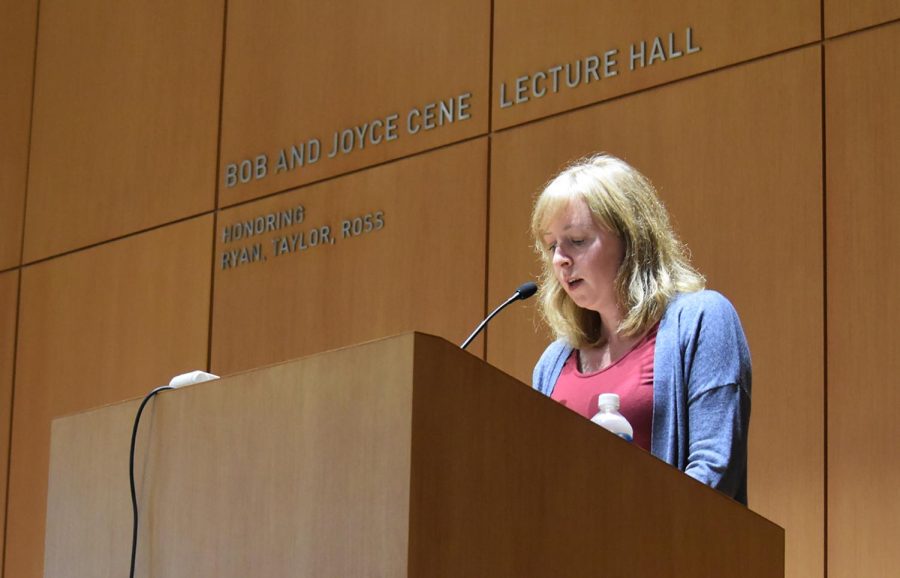Poets applaud 2016 Wick Poetry Prize winner at reading, workshop
Poet Christine Gosnay speaks at the Wick Poetry Prize reading at the Center for Architecture and Environmental Design Tuesday, Sept. 19, 2017.
Christine Gosnay, the 2016 winner of the Stan and Tom Wick Poetry Prize, stood at a wooden podium in front of a quiet room of spectators. The lights were dimmed, and the atmosphere was heavy with anticipation — then, she adjusted the microphone.
“I’m really honored to be here and to be reading these poems, for maybe the first or second time out loud in many cases, and I’m really excited that this reading is finally happening,” Gosnay said. “I’ve been looking forward to it for a long time.”
Gosnay read “Even Years,” her first book of poems published through the Kent State University Press, alongside Angie Estes, the poet who judged her submission, in the Center for Architecture and Environmental Design building Tuesday.
“I think there are many poems that deserve to be heard out loud, to be given the real sort of extra push into spoken language, because poetry is a spoken art,” Gosnay said. “Historically, poems would only be said out loud. And I think it’s a relatively new concept that we have just to read them, and I think we’re losing a lot from that. … I think it’s very important as a writer to force yourself to speak out loud when you’re writing poems, and it’s a dimension that you can’t ignore.”
At 36 years old, Gosnay realized that she might not have been a conventional candidate for a first book of poems when she first sent the collection, which she worked on for six years.
“I had a completely separate life — a software engineer, and I went to college to study French translation, so I didn’t really think of myself as ever being anything else other than just,” Gosnay said. “I had a job, I had my kids — but I was always writing poetry, and I put together a much earlier book that I ended up abandoning once I became more serious about writing.”
Still, Estes, who is nominated for the Pulitzer Prize and the author of several books, selected “Even Years” as the winner from more than 500 submissions — much to Gosnay’s surprise.
“So perhaps the essential activity when reading manuscripts is not so much looking for something — since we rarely come to poetry with a knowledge of exactly what it is that we’re looking for — but rather listening for a poem or poems that speak,” Estes said. “In the midst of reading volumes and volumes of submissions, one suddenly hears a voice, and a living, breathing presence rises from the page.”
At the reading, both Gosnay and Estes shared a number of poems — for Gosnay, the topics ranged from works inspired by her own life to a character meant to represent her own soul.
“I think (Christine) has (an) almost kind of a spiritual way of looking at the world, it’s very ethereal, there’s kind of a thinness between sort of real life events, and then there’s … this sort of otherworldly context and so I think it’s almost there’s some poems that are almost a little spooky, and I think, probably, her book is one of the strongest first books we’ve ever published,” said Jessica Jewell, the senior academic program director at the Wick Poetry Center.
Before the reading, Gosnay led a workshop for those students involved with the Wick Poetry Center, where she worked through writing and discussed poems with a small group of Kent State students.
“You get this outline of something new that you can start, you know?” said Isaiah Hunt, a senior English major. “That’s how I felt with the last workshop, where I got like this new kind of a way of doing poetry, and I feel like I’m about to do the same with Christine. … She’s handing us this outline that we have, and now we can do what we please with it. We could switch it up, we insert our own style into it.”
Gosnay will continue to work with students the rest of the week, even after her much-anticipated debut. Though the reading was only one of a few others Gosnay has performed, she said she felt it went great.
“I think we take for granted being able to communicate with each other, and stop ourselves from saying so much that we would normally say just because we’re worried about what the other person’s ready to hear,” Gosnay said. “So I think it’s important to just trust what your listener — whether it’s your friend or someone in an audience — just trust the listener to make the conclusions that they want to make, and bring their own experiences to hearing poems.”
Cameron Gorman is the humanities reporter. Contact her at [email protected].



